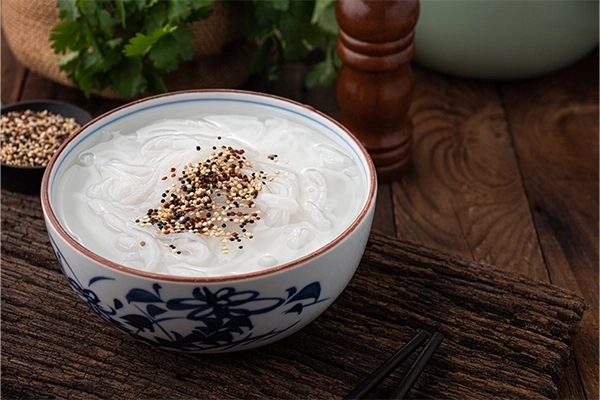Yogurt is one of the most popular dairy products that has many fans because of its delicious taste and health benefits. In this comprehensive guide, we take a closer look at yogurt calories and nutrients.
Yogurt calories
The number of calories in yogurt varies depending on its type. On average, one cup (245 grams) of low-fat plain yogurt has about 100 to 150 calories. This amount can increase up to 200 calories for high-fat yogurt. Flavored yogurts are usually higher in calories due to added sweeteners.
The important thing about yogurt calorie is that the source of these calories is mainly from protein and healthy carbohydrates, which are good for the body.

Yogurt nutrition
Yogurt is rich in essential nutrients that are important for the health of the body:
1. Protein: Yogurt is an excellent source of protein, which is essential for building and repairing body tissues.
2. Calcium is vital for healthy bones and teeth.
3. B vitamins: especially B12 and riboflavin, which are important for energy metabolism.
4. Probiotics: Beneficial bacteria that contribute to digestive health.
5. Potassium: Important for regulating blood pressure and muscle function.
A proper understanding of yogurt calories and nutrients can help you choose the best type of yogurt for your health and nutritional goals. Remember that low-fat or fat-free yogurt can be a good option for those who want to reap the benefits of yogurt while controlling their calorie intake.
Finally, despite being relatively low in calories, yogurt is a rich source of nutrients that can be an important part of a balanced and healthy diet.
The difference in calories in yogurt types
Yogurt calorie are different in different types of this dairy product. These differences depend on various factors including the amount of fat and additives. In the following, we will examine the calories of different types of yogurt and its nutrients:
1. Low-fat plain yogurt: about 100-120 calories per cup (245 grams)
2. Plain full-fat yogurt: about 150-180 calories per cup
3. Low-fat Greek yogurt: About 120-140 calories per cup
4. Full-fat Greek yogurt: about 200-180 calories per cup
5. Flavored yogurt (with added sugar): About 200-150 calories per cup
6. Kefir yogurt: about 100-150 calories per cup
Note that yogurt calories are only one aspect of its nutritional value. Yogurt nutritions are also very important. For example, although Greek yogurt may have more calories, it also contains more protein.
Low-fat yogurts are usually lower in calories, but may have added sugar to compensate for the flavor, which increases the calories. Natural yogurts without additives, despite the difference in yogurt calories, are still a good source of nutrients such as calcium, protein, and probiotics.
Choosing the type of yogurt should be based on nutritional goals, personal taste, and daily caloric needs, while also paying attention to nutrients.
The role of yogurt calorie in the diet
Yogurt calories play an important role in the diet. This dairy product, in addition to providing energy, contains yogurt nutritions that are essential for health. A correct understanding of the role of yogurt calorie can help improve the diet plan:
1. Low calorie snack
Yogurt calories are relatively low, especially in low-fat varieties. This feature makes yogurt an excellent snack for people trying to control their weight.
2. Feeling full
Nutrients like protein help to make you feel full. This can lead to a reduction in calorie consumption in subsequent meals.
3. Replace high-calorie foods
Substituting yogurt for high-fat sauces or cream can reduce calorie intake while adding yogurt nutritions to the diet.
4. Balance in the diet
Yogurt calories can provide a portion of your daily calorie needs, while also providing essential nutrients.
5. Improve metabolism
The protein in yogurt helps maintain and build muscle, which can increase your basal metabolism and burn more calories.
6. Blood sugar regulation
Consumption of yogurt, especially low-sweet types, can help regulate blood sugar and prevent extreme energy fluctuations.
7. Sports supplement
Yogurt calories, along with its protein and carbohydrates, can be useful for recovering energy after exercise.
8. Variety in diet
Adding yogurt to the diet can increase calorie and nutrient diversity, which is important for maintaining a balanced diet.

Finally, a proper understanding of yogurt calories and yogurt nutritions can help people make the most of this nutritious food in their diet. Yogurt can be an important part of a balanced and healthy diet, as long as it is consumed in moderation.
Conclusion
A proper understanding of yogurt calories and their role in the diet can help improve overall health and achieve nutritional goals. Yogurt, despite the difference in the amount of calories of its different types, is a valuable food that can form an important part of a balanced diet.
Yogurt nutritions, including protein, calcium, and probiotics, give high nutritional value to this dairy product. These nutrients, along with yogurt’s reasonable calories, make it a good snack option, a substitute for high-calorie foods, and even a supplement for sports activities.
However, it is important that consumers pay attention to the difference in calories in different types of yogurt and choose the right type according to their individual needs and health goals. Low-fat or fat-free yogurts can be good for people looking to reduce their calorie intake, while full-fat yogurts can be good for people who need more calories.
Finally, knowing yogurt calories and nutrients helps us use this nutritious food wisely in our diet. By observing the balance in consumption and paying attention to individual needs, yogurt can play an important role in improving the quality of nutrition and maintaining the overall health of the body.










